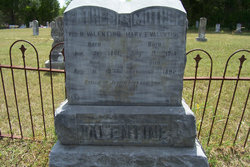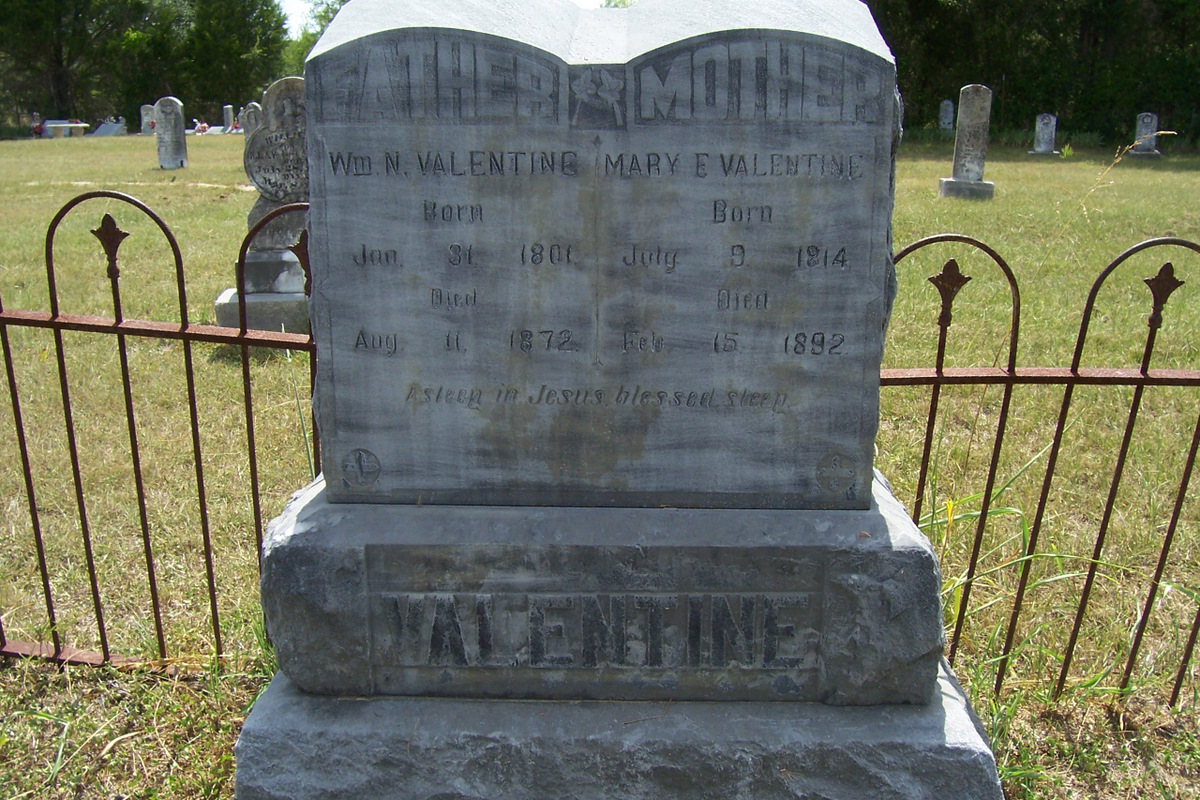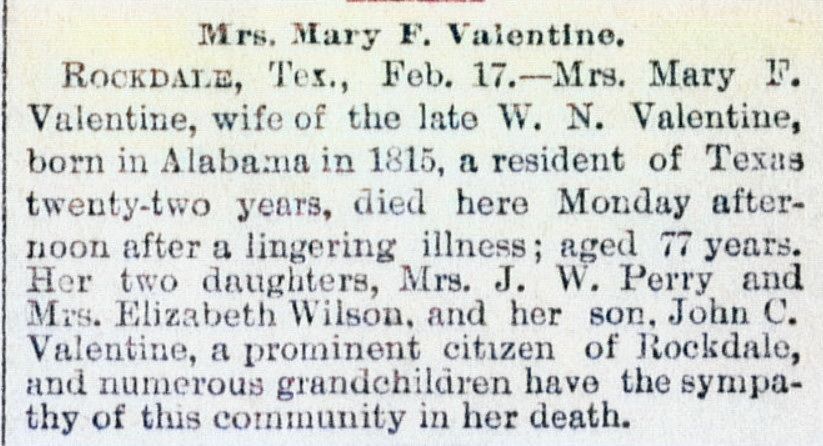. . . . . . . . . .
Mary's niece, Mollie West, often spoke of her childhood memories of growing up in Oktibbeha County, Mississippi, and of her Aunt Mary and Uncle Bill . . . Mollie's granddaughter, Ruby Nettles, preserved some of those stories for posterity . . . here are some of those memories . . .
Because the men folk were soon away from their homes fighting or training, the women and children often gathered in the homes of relatives who had houses large enough to accommodate them. Sarah Mildred's sister, Mrs. Wm. (Mary) Valentine, lived in a home of six rooms, a long wide hall, two large porches and a portico in front of Mary's room. The Valentine children were Dave, John, Lou and Margaret, and their West cousins were Mollie, Billy and Dave. So for the four long years [1861-1865] of war the Valentine residence was often home to the Wests.
"Life would have been fun," said Grandma, "but for the vast amount of work to be done. It left little time for play. Even though I was only nine years old when the war broke out I spun many yards of cloth for our own clothing and for the soldiers. Uncle Bill and Aunt Mary had a marvelous library and every spare moment I found I had my nose in a book."
"But let me describe Uncle Bill and Aunt Mary's home a little better. I've told you how big it was -- and you have to understand those rooms were large with high ceilings. There was also a large cellar under the house with two huge boxes in it that held apples from the orchard across the road from the house. I can see and smell those blossoms yet when Spring comes each year!"
"The house was surrounded by a picket fence that enclosed a large yard. The walk from the front yard gate to the house was lined with jonquils, daffodils and snowdrops. The house itself was white, set on brick pillars. So it was a pleasure to be there out of our little cramped home." . . .
"One day Aunt Mary sent some of us under the house to dig and line a deep hole outside the cellar. Into this she put silverware, deeds, and other valuables and it proved to be a wise thing to do. The enemy never did uncover it either."
"Closer came the fighting until one day* we could hear the cannon booming as a battle was fought over a bridge maybe twelve miles from our home. I remember what they called that bridge, though I don't know how you would spell it -- Sookietoncha*, it sounded like. It made cold chills run over you to hear that cannon."
"We had already had several wounded soldiers to take care of -- Aunt Mary and Mother were fine nurses -- but now they really poured into the house. I remember that Col. Forrest had some by the day before and asked Aunt Mary for a horse to ride. She had told him to take his pick, only leave her old Tom to ride, since he was real gentle. But he insisted on using Tom, and in anger she told him, 'I hope he does you no good, Sir!'"
"Late the next day, after the battle at the bridge, old Tom came home riderless with blood all over the saddle -- Col. Forrest had been killed* on him. Aunt Mary wept in remorse and never again rode old Tom. Col. Forrest and Gen. Forrest were brothers, and we saw them often."
*NOTE -- Col. Jeffrey Forrest, youngest brother of Gen. Nathan Bedford Forrest, was killed with a bullet to the throat near the Sakatonchee River between Okolona and Ivey's Hill during the Meridian Expedition -- on 22 February 1864. A detailed account of this campaign, written by Ronald G. Domer, was published in the May 1998 issue of "America's Civil War."
"Eugene Willoughby, about 16 years of age, was a southern boy who had run away from home and joined the army. He was wounded in this battle and was brought to Aunt Mary's. We nursed him back to health and he later left with his company. I wish I could say the same about all the sick and wounded we had there. Oh! We had so many that there was no more room to put them. Even the long hall had pallets from one end to the other. It was at this time that Aunt Mary took a sick boy into the room she was allowing a southern General to use, and the General objected because he was entertaining some bigwigs. The next morning she informed him in no uncertain terms that he could move his quarters elsewhere, for to her no one was more important than a southern soldier in need of nursing. He went to Grandpa Bell's."
. . . . . . . . . .
. . . . . . . . . .
Mary's niece, Mollie West, often spoke of her childhood memories of growing up in Oktibbeha County, Mississippi, and of her Aunt Mary and Uncle Bill . . . Mollie's granddaughter, Ruby Nettles, preserved some of those stories for posterity . . . here are some of those memories . . .
Because the men folk were soon away from their homes fighting or training, the women and children often gathered in the homes of relatives who had houses large enough to accommodate them. Sarah Mildred's sister, Mrs. Wm. (Mary) Valentine, lived in a home of six rooms, a long wide hall, two large porches and a portico in front of Mary's room. The Valentine children were Dave, John, Lou and Margaret, and their West cousins were Mollie, Billy and Dave. So for the four long years [1861-1865] of war the Valentine residence was often home to the Wests.
"Life would have been fun," said Grandma, "but for the vast amount of work to be done. It left little time for play. Even though I was only nine years old when the war broke out I spun many yards of cloth for our own clothing and for the soldiers. Uncle Bill and Aunt Mary had a marvelous library and every spare moment I found I had my nose in a book."
"But let me describe Uncle Bill and Aunt Mary's home a little better. I've told you how big it was -- and you have to understand those rooms were large with high ceilings. There was also a large cellar under the house with two huge boxes in it that held apples from the orchard across the road from the house. I can see and smell those blossoms yet when Spring comes each year!"
"The house was surrounded by a picket fence that enclosed a large yard. The walk from the front yard gate to the house was lined with jonquils, daffodils and snowdrops. The house itself was white, set on brick pillars. So it was a pleasure to be there out of our little cramped home." . . .
"One day Aunt Mary sent some of us under the house to dig and line a deep hole outside the cellar. Into this she put silverware, deeds, and other valuables and it proved to be a wise thing to do. The enemy never did uncover it either."
"Closer came the fighting until one day* we could hear the cannon booming as a battle was fought over a bridge maybe twelve miles from our home. I remember what they called that bridge, though I don't know how you would spell it -- Sookietoncha*, it sounded like. It made cold chills run over you to hear that cannon."
"We had already had several wounded soldiers to take care of -- Aunt Mary and Mother were fine nurses -- but now they really poured into the house. I remember that Col. Forrest had some by the day before and asked Aunt Mary for a horse to ride. She had told him to take his pick, only leave her old Tom to ride, since he was real gentle. But he insisted on using Tom, and in anger she told him, 'I hope he does you no good, Sir!'"
"Late the next day, after the battle at the bridge, old Tom came home riderless with blood all over the saddle -- Col. Forrest had been killed* on him. Aunt Mary wept in remorse and never again rode old Tom. Col. Forrest and Gen. Forrest were brothers, and we saw them often."
*NOTE -- Col. Jeffrey Forrest, youngest brother of Gen. Nathan Bedford Forrest, was killed with a bullet to the throat near the Sakatonchee River between Okolona and Ivey's Hill during the Meridian Expedition -- on 22 February 1864. A detailed account of this campaign, written by Ronald G. Domer, was published in the May 1998 issue of "America's Civil War."
"Eugene Willoughby, about 16 years of age, was a southern boy who had run away from home and joined the army. He was wounded in this battle and was brought to Aunt Mary's. We nursed him back to health and he later left with his company. I wish I could say the same about all the sick and wounded we had there. Oh! We had so many that there was no more room to put them. Even the long hall had pallets from one end to the other. It was at this time that Aunt Mary took a sick boy into the room she was allowing a southern General to use, and the General objected because he was entertaining some bigwigs. The next morning she informed him in no uncertain terms that he could move his quarters elsewhere, for to her no one was more important than a southern soldier in need of nursing. He went to Grandpa Bell's."
. . . . . . . . . .
Family Members
Advertisement
Advertisement








